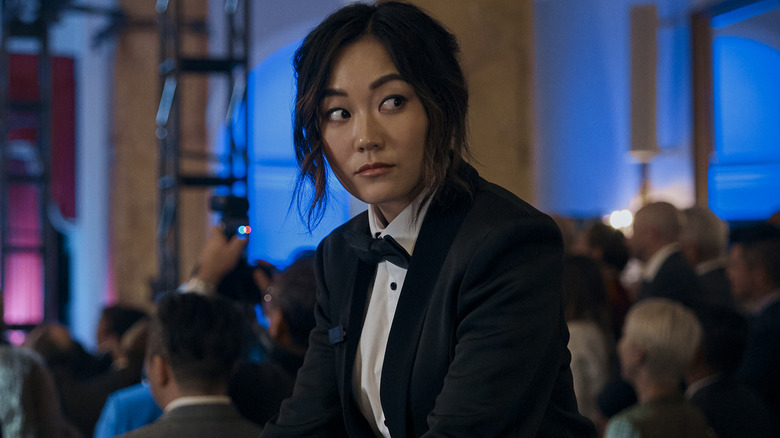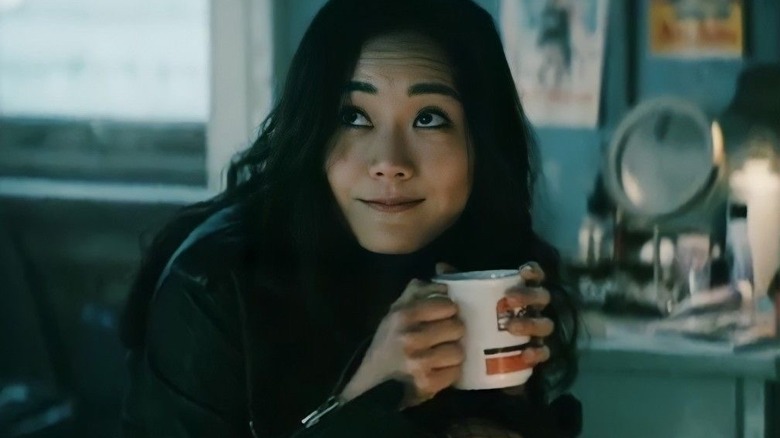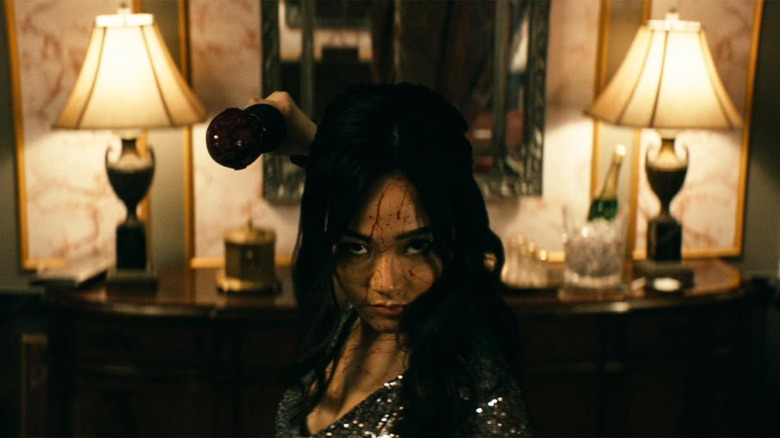The Boys Star Karen Fukuhara Had An Important Request For Kimiko's Muteness
When Karen Fukuhara's character is first introduced in the Prime Video superhero satire "The Boys," she's not even given a name. She's just "The Girl" — a mute Japanese woman with some seriously strong superpowers. She's a silent assassin, capable of taking incredible levels of damage and healing from them, plus she has superhuman strength and short bursts of super speed, making her extremely formidable.
It's only as the series progresses that we learn her name is Kimiko, and she starts communicating with Frenchie (Tomer Capone) via the sign language she created with her late brother. For most of the series, however, we don't know why Kimiko can't speak. Is it the result of some physical ailment or accident, or is it something psychological? Though we eventually learn the tragic reason behind Kimiko's silence toward the end of "The Boys" season 4, it turns out that Fukuhara was thinking ahead long before even she knew what led to Kimiko's muteness.
In an interview with The Wrap, Fukuhara explained that she had one big request when it came to her character's lack of verbal communication, and it was a pretty wise one. No matter what happened with Kimiko, she told showrunner Eric Kripke that she wanted her inability to speak to be because of a psychological or mental reason, not a physical one.
Kimiko's muteness needed to be psychological
In the interview, Fukuhara shared that she told Kripke early on that she didn't want Kimiko's lack of speech to come from a physical attribute because that could make it impossible for her to ever recover her voice, which would limit them in terms of storytelling. It would take away any "tinge of hope" that they could have Kimiko speak in future seasons. According to Fukuhara, Kripke was "really receptive" to her concerns right from the start. Then, when she read the scripts for season 4 and learned that Kimiko lost her ability to speak when she killed another girl during her assassin training, she was thrilled:
"I love it because this entire season is about even the heroic characters facing their demons, such as Annie's past with Firecracker. She was never this cookie-cutter good person that we always expected her to be, and I love that entire storyline and backstory because it gives her a lot more humanity. I think the writers were able to do that with Kimiko. She's always kind of viewed herself as a victim to Shining Light, a victim to Compound V. A victim to all the s***ty things that have come her way, but in season 4, she had to face her own darkness and own up to all the wrongdoing she did to other people."
Though Kimiko is arguably one of the more decent people in all of "The Boys," she does have her own painful backstory and did some pretty awful things in order to survive. She's been incredibly unselfish throughout the series, even giving up her dream of being a "normal," powerless human in order to save Frenchie, but her muteness is a symptom of a guilty conscience nonetheless.
Fukuhara was thankful for Kripke's open-mindedness
Fukuhara noted that she loved working with Kripke because he was so open-minded when it came to collaborating, saying that it almost felt like "you're bringing these ideas to a friend." Some ideas didn't always make it to the final draft, of course, but she said that Kripke always had "justifications" for why an idea would or wouldn't work, "so you leave that conversation feeling seen and heard."
That sounds like the ultimate dream in any creative or collaborative workplace, and said it was all she or her castmates could really want from a showrunner. Kripke sounds like one heck of a boss, even if sometimes he likes pushing his actor's buttons to the point that they flat-out refuse to do a scene, like Jensen Ackles as Soldier Boy in season 3. Oh well — at least he knew when to back off, and he and Ackles ended up coming up with a compromise.
It'll be quite the sad goodbye to "The Boys" in many ways when the series ends with season 5, and it sounds like it will be bittersweet behind-the-scenes too as the cast say goodbye to one another and the showrunner that let them really speak their minds — even when their characters were mute.


